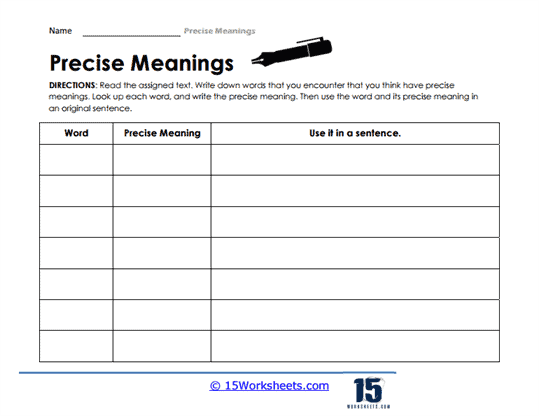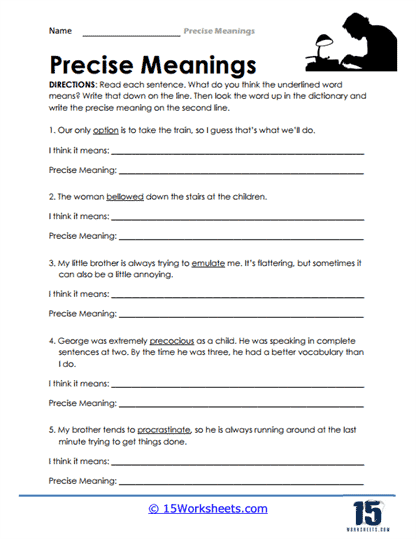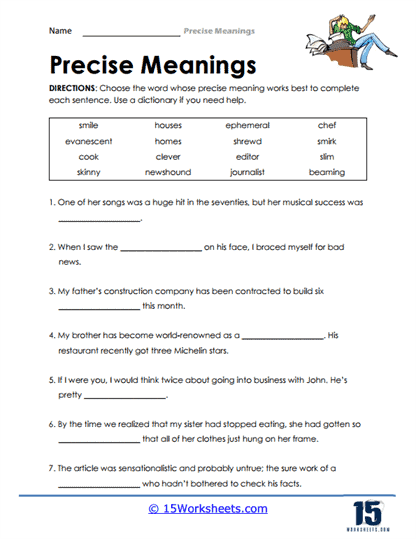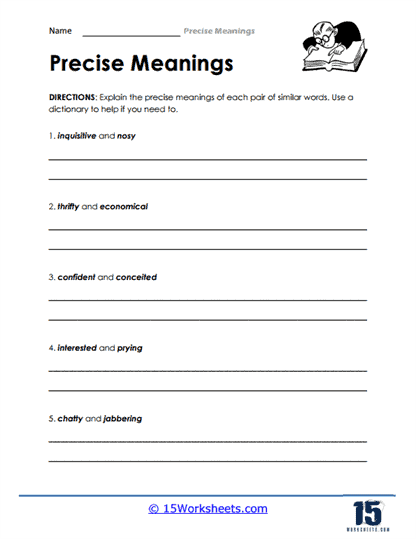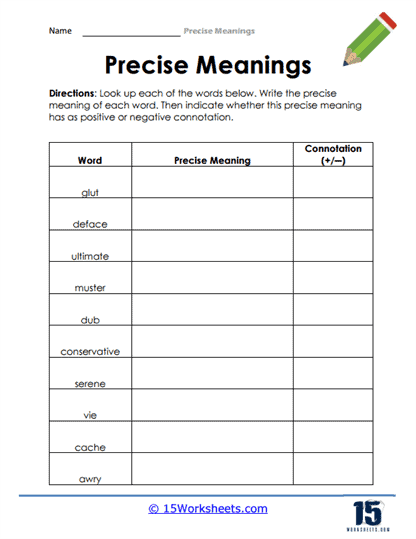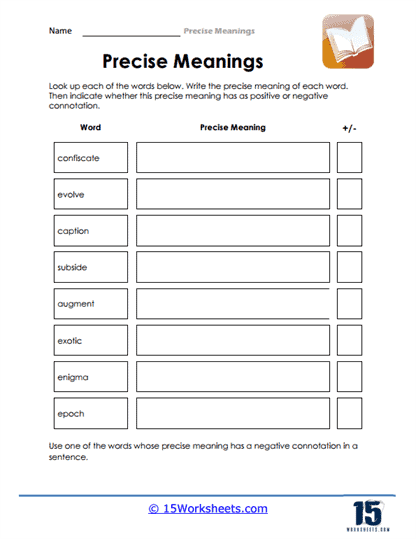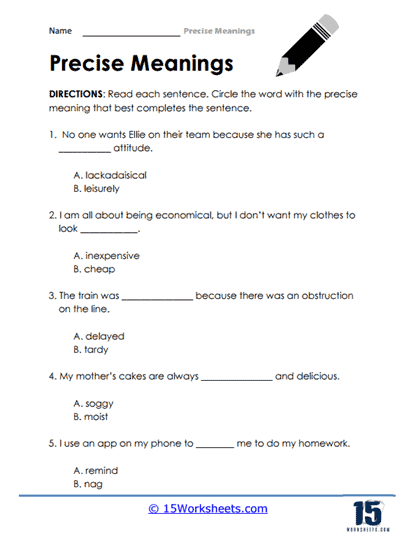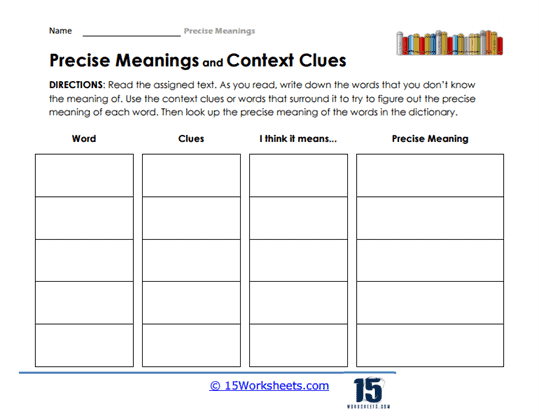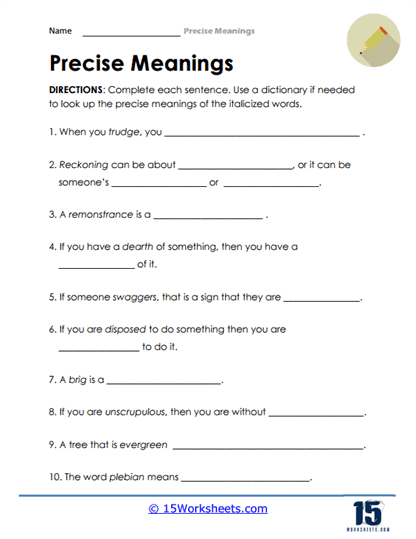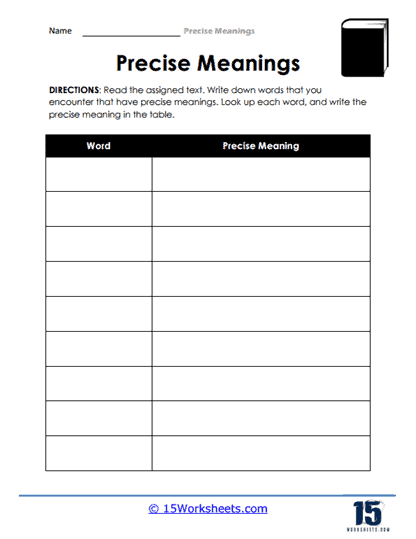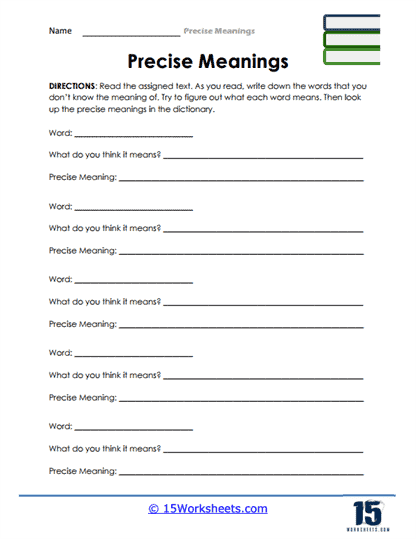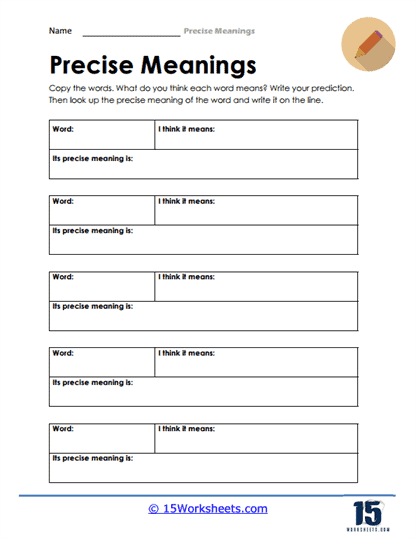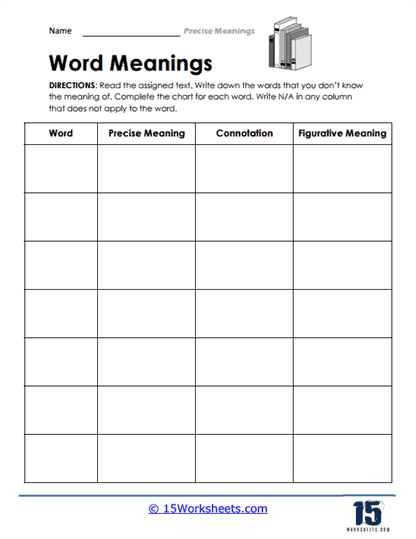Precise Word Meanings Worksheets
All About These 15 Worksheets
This series of 15 worksheets on precise word meanings offers an engaging and enlightening learning experience for students to explore the subtle nuances and distinctions between words with similar meanings.
Through a variety of activities and exercises, students will enhance their vocabulary, deepen their understanding of word usage, and develop critical thinking skills. These worksheets promote linguistic precision, analytical thinking, and effective communication. Students will gain valuable insights into the importance of selecting the right word for precise communication. By completing these worksheets, students will:
- Determine which words have a more precise meaning, and define them using a dictionary if needed;
- Use words with precise meanings in their own sentences;
- Fill in the blanks to complete sentences with the appropriate words that have precise meanings;
- Determine whether words have a positive or negative connotation;
- Identify sentences that use words with precise meanings correctly;
- Use context clues to figure out the precise meanings of various words;
- And explore the figurative meanings that some words have.
This series of worksheets on precise word meanings empowers students to refine their vocabulary skills, develop critical thinking abilities, and enhance their communication effectiveness. By exploring the subtle differences between words with similar meanings, students gain a deeper understanding of language nuances and the importance of precision in conveying meaning. In summary, these worksheets foster linguistic precision, analytical thinking, and empower students to choose the most fitting words to express their ideas accurately.
Tips for Determining the Meaning of a Word
Sometimes in our lives, whether it’s a book we read in English class or an exam, we realize that we have no idea what some words mean. Not always do we have the time, resources, or permission to look up a word’s meaning in the context of an exam. So what do we do in those situations?
Most people decide to wing it or completely ignore the word. However, what if we told you that there is another way? Here are a few tips that will help you enhance your reading and writing skills by making you a professional at determining the meaning of a word without any help:
- Focus On the Context
You can learn much about a word’s meaning by looking at the context. For instance, if someone says, “I was flabbergasted to see him there, I would have never in a million years expected that he would be able to make it,” Even if you are unaware of the definition of the term “flabbergasted,” it is pretty apparent from the context of the sentence that it refers to shock or surprise.
Analyze the context in which the word is used. The surrounding words, phrases, and sentences can provide clues about the intended meaning of the word. Pay attention to examples, comparisons, contrasts, and explanations that may help reveal the meaning.
Therefore, whether it’s an essay, book, conversation, or lecture, you may construct a solid understanding of any word’s meaning by simply connecting the context to the word.
- Break Up the Word
Most words are constructed using a mix of roots, prefixes, and suffixes. We can easily find meaning by breaking up these parts of a word. This process is also called structural analysis.
Prefixes
Looking at the word prefixes, if we break up the word, we will be left with ‘pre,’ which means first. Hence, prefixes refer to the first few letters of a word, for example, re, de, ir, down, in and im, etc. By adding prefixes to a word, we can completely change its meaning.
For example, the word ‘able’ means to have power or skill to do something; however, if we add ‘un’ to it, we completely change its meaning to someone lacking the power or skill to do something.
Suffixes
Opposite to prefixes, suffixes refer to the letter at the end of a word. For example, able, full, ion, ment, etc. Additionally, suffixes also can change the meaning of a word; for example, garden means an area outside the house with natural greenery; if we add ‘ing’ to it, we will have the word gardening, which refers to the act of working on a piece of land to add greenery to it.
- Root Words
Many English terms contain Latin roots, even though Latin is no longer a widely spoken language. You may discover a word’s meaning by being aware of and identifying these basic words in English. For example, Reg refers to “to control” in Latin; regulate, Royal and Regime are terms that support this idea.
You can also identify words with similar (synonyms) or opposite (antonyms) meanings that may be used in the same context. They can offer insights into the precise meaning of the word in question.
Most words are made up of suffixes, prefixes, and root words. By learning the art of examining the context and focusing on these four factors, one can enhance their ability to decipher words’ meanings and make writing and reading an easier and more enjoyable endeavor.


